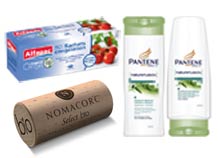
Brazilian resins and biopolymers producer Braskem is undertaking various steps in expanding its already growing portfolio of biopolymers and resins for the global market. In Asia, Braskem has supplied its renewable materials to cosmetics brand Shiseido since 2008. Shiseido was also the first Japanese cosmetics company to employ packaging made from renewable materials. "Our exports constitute 10-15% of our output. We also have a good market share in Japan, where recycling is important. The country also incinerates a large part of its trash to generate energy, while the use of products from renewable sources contributes to reduce global warming," said a spokesperson.
By next year, the firm will launch a new line of green LDPE, completing its line-up of PE made from renewable resources that include HDPE and LLDPE variants. It will have a capacity of 30,000 tonnes/year of green LDPE.
Other announcements it has made recently are as follows:-
- It renewed its agreement with Toyota Tsusho, the trading company of Toyota Motor Group, for the distribution of green HDPE, LLDPE and LDPE in Asia until 2018. The agreement strengthens the alliance between the companies and reaffirms the interest in Asia for the product made from sugarcane ethanol, a renewable source. Toyota Tsusho serves a broad range of clients in Asia, especially in Japan. The original agreement between the companies was signed in 2010, the same year when Braskem inaugurated its green ethylene unit at the Triunfo Petrochemical Complex, with production capacity of 200 kilotonnes/year.
- "Toyota Tsusho supported the bio-based PE development project even when it was in the pilot plant phase at around 2007, and has played a significant role in market expansion in Asia for products from renewable sources", says Luciano Guidolin, Vice-President of the Polyolefins, Comperj and Renewables Unit at Braskem.
- It is investing around US$23 million to expand its annual production capacity of metallocene-based LLDPE by 120 kilotonnes/year. Of this total, 100 kilotonnes correspond to the Flexus family, which is the brand under which Braskem's metallocene-based polyethylenes (mPEs) are sold. The company will convert one of its PE production lines to offer a resin that employs the latest technology in plastic films manufacturing. The decision attests to Braskem's commitment to furthering the development of Brazil's plastics production chain.
- The unit located in the Camaçari Petrochemical Complex in the state of Bahia will have a line fully dedicated to the resin's production. Braskem has already concluded the engineering studies for the plant's conversion. The production line is expected to start operations in the first half of 2015.
- Flexus is used in packaging that requires specific features, such as increased resistance, gloss, transparency and sealing properties. The product line targets manufacturers of speciality films, technical reels and industrial films.
- Since 2004, Braskem has led the Latin American market in supplying mPEs, with production capacity in excess of 350 kilotonnes/year. The company also offers an application engineering structure that clients can use to develop specific formulations for their films.
- It has signed a MOU with potential joint venture partner global styrenics leader Styrolution Group to undertake a feasibility study for a plant in Brazil. The jv will analyse the economic feasibility of installing a plant with production capacity of 100 kilotonnes/year of styrenics specialities and the copolymers ABS and SAN to serve clients in Brazil as well as the rest of South America.
- In partnership with the Mexican group Idesa, Braskem is riding the wave of the resurgence of the petrochemical industry in the Americas with the construction of a complex in Mexico with the capability to produce 1.05 million tonnes/year of PE, as well as an equivalent volume of ethylene. This will be the first new petrochemical project to benefit from the increased competitiveness provided by shale gas in the US. The US$3.2 billion investment is also part of the company's strategy to diversify its feedstock sources.
- Braskem's 3Q results increased by 12% over the previous year, driven by better international margins. "The improvement in the global economy and the tax relief for our raw materials in response to industry demands made positive contributions to Braskem's performance and were also fundamental in supporting a partial recovery in the competitiveness of Brazil's petrochemical chain," said Carlos Fadigas, Braskem's CEO. "This has allowed us to strengthen our capacity to invest sustainably in order to accompany the growth in the Brazilian market," he added.

















